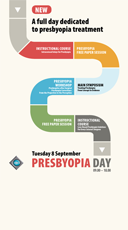Multifocal intraocular lens implantation following laser vision correction
(results will display both Free Papers & Poster)
Session Details
Session Title: Pseudophakic IOLs: Multifocal & Accommodative
Session Date/Time: Monday 07/09/2015 | 08:00-10:30
Paper Time: 08:24
Venue: Room 1
First Author: : J.Chawla UK
Co Author(s): :
Abstract Details
Purpose:
Patients presenting with cataracts and who have had prior laser vision correction pose a challenge for surgeon. This set of patients have a demanding mind set and expect similar quality of vision and visual outcomes following cataract surgery. With the advent of newer technology and refined IOL calculation techniques, the predictability of achieving emmetropia has improved of late with monofocal implants. However, the use of multifocal lens implants is rare in patients with prior LASIK. This study evaluates the visual and refractive outcomes of multifocal lens implantation in cataract surgery with prior Lasik using refractive rotational asymmetric multifocal lens implant.
Setting:
This study was undertaken at Spire Hartswood Hospital in Essex, UK. All the patients were operated by a single surgeon.
Methods:
26 patients presenting with cataracts underwent bilateral phacoemulsification with multifocal lens implantation. Of these,18 patients had prior myopic lasik/ PRK, 6 had hyperopic Lasik,, 1 RK and 1 conductive keratoplasty. In 24 patients Lentis M Plus lens was used in all the patients.No prior refractive data was available in 15 patients. IOL calculations were performed using web based ASCRS calculator. All the procedures were uneventful. Post operatively patients were assessed for uncorrected and best corrected near, intermediate and distance vision. Patient satisfaction surveys were undertaken to determine quality of life changes and dysphotic symptoms.
Results:
23 patients achieved uniocular uncorrected distance visual acuityof 6/9 or better and uncorrected near visual acuity of N8. Over 3 months period, all patients had achieved adequate intermediate vision. All patients had uncorrected binocular vision of 6/9 or better and N6 for near. Mean postoperative spherical equivalent on subjective refraction was +/- 0.5 D in 23 patients. Night vision symptoms were present in 4 patients,which resolved over 6 months. There was no loss of best corrected distance visual acuity.25 patients had achieved spectacle independence for near, intermediate and distance vision. All patients expressed satisfaction with the results and would recommend this procedure to others
Conclusions:
Insertion of a multifocal lens implant in a patient with pre-existing low contrast sensitivity and night vision problems can result in sub-optimal outcomes and dissatisfaction. With a meticulous technique, careful case selection, proper pre-operative counselling and appropriate lens implants like Lentis M Plus multifocal lens implant, it was possible to achieve satisfactory results.
Financial Interest:
NONE





